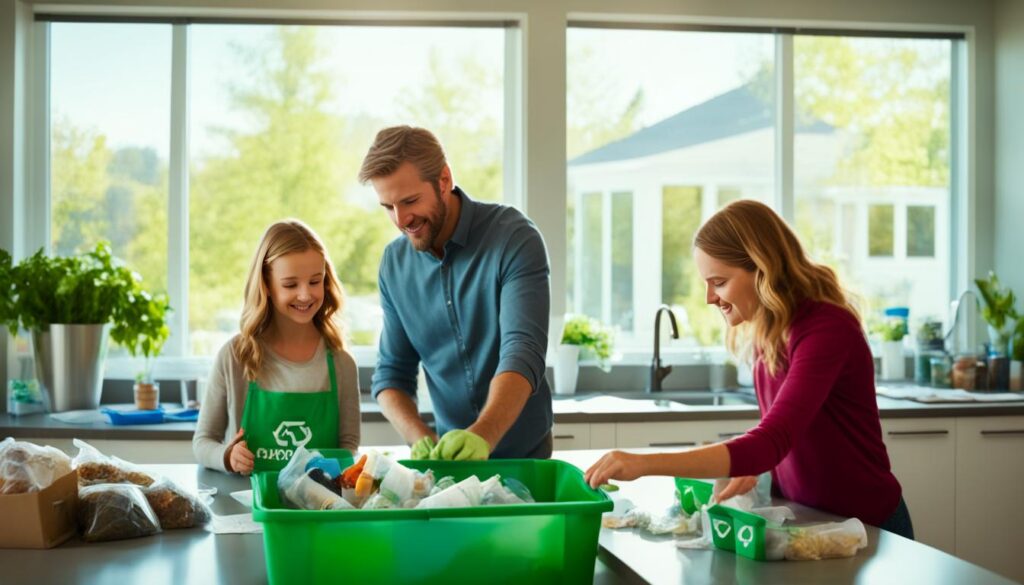Did you know that Brazil recycles only 4% of the 80 million tons of waste produced annually? This situation motivates us to adopt simple habits for a greener future. Home recycling is key to protecting the environment. It gives a new life to materials that are no longer useful.
Want to know how to recycle at home effectively? This article will provide tips and tricks to make home recycling an easy habit. We’ll learn how to sort waste, do home composting, and dispose of items that cannot be recycled. Together, we can make your home a more sustainable place!
Key Learnings
- Home recycling is essential for protecting the environment.
- So far, only 4% of waste in Brazil is recycled.
- Proper waste separation is the first step towards effective recycling at home.
- Composting reduces up to 30% of the waste that goes to landfills.
- Proper disposal of non-recyclable waste is vital for sustainability.
What is Home Recycling?
Home recycling involves sorting and disposing of waste correctly at home. This includes paper, plastic, glass, and metal. The goal is to reuse these materials and reduce the waste that goes to landfills.
Understanding the Importance of Recycling at Home
Recycling at home greatly benefits the environment. Each person doing their part can make a significant impact. This helps us use fewer natural resources, produce fewer climate-damaging gases, and protect soil and water.
Statistics and Environmental Impacts of Insufficient Recycling
Brazil recycles only 4% of the waste it produces, about 80 million tons per year. With plastic, the situation is even worse: we recycle only 1.3% of what we produce. This is much lower than the global average of 9% (according to WWF Brazil).
This low recycling rate severely harms the environment. It increases the need to extract natural resources, generates more climate-damaging gases, and contaminates soil and water.
It is crucial to increase home recycling in Brazil. This will help protect the environment and reduce the damage caused by waste.
Separation and Sorting of Recyclable Waste
Properly separating recyclable waste at home is crucial for effective recycling. The main Types of Recyclable Waste are paper, plastic, glass, and metal. Each should go into the correct Residential Selective Collection Bin to avoid contaminating the recycling process.
Types of Recyclable Waste
- Paper: newspapers, magazines, cardboard boxes, office papers, etc.
- Plastic: bottles, bags, packaging, etc.
- Glass: bottles, jars, containers, etc.
- Metal: beverage cans, cans of food, etc.
How to Correctly Separate Waste for Recycling
To separate waste at home, follow the rules of your neighborhood’s Residential Selective Collection. Place each material in the correct Recycling Bin: blue for paper and cardboard, red for plastic, green for glass, and yellow for metal. Remember to clean containers before discarding them to avoid contamination. Proper Waste Sorting helps process materials correctly at recycling centers.
| Type of Waste | Bin Color |
|---|---|
| Paper and Cardboard | Blue |
| Plastic | Red |
| Glass | Green |
| Metal | Yellow |
Tips for More Effective Home Recycling
Home recycling significantly helps protect the environment. However, many people do not recycle correctly, which worsens the problem. To improve recycling at home, consider these important tips:
- Reduce waste by consuming less and choosing products with minimal packaging.
- Teach children about the importance of sustainability from an early age, encouraging eco-friendly habits.
- Recycle materials like styrofoam, which can be reused in construction.
- Participate in reverse logistics and circular economy programs, such as Knauf’s collection points for recycling EPS.

With these tips for better home recycling, you significantly contribute to the environment and the future. Small actions can make a big difference.
“Recycling household waste is one of the best ways to preserve the environment.”
Recycling Statistics in Brazil
Brazil still recycles very little. Abrelpe states that the country recycles only 4% of the 80 million tons of waste produced annually. WWF Brazil reports that Brazil recycles only 1.3% of its plastic, despite being a major producer.
| Indicator | Value |
|---|---|
| Domestic Waste Recycling Rate in Brazil | 4% |
| Plastic Recycling Rate in Brazil | 1.3% |
| Global Plastic Recycling Rate | 9% |
These figures show that we need to significantly improve efficient recycling and sustainable habits in Brazil. Following the tips here is an important step towards that goal.
Organic Waste Recycling and Home Composting
In addition to paper, plastic, and glass, organic waste can also be recycled. This includes food scraps and garden leaves. Home composting is a practical way to recycle this waste. It transforms organic waste into rich soil for gardens and helps reduce the amount of waste that goes to landfills.
Benefits of Home Composting
Composting at home provides many benefits, including:
- Reduces the amount of waste sent to landfills.
- Improves soil quality for gardening.
- Reduces greenhouse gas emissions.
By adopting home composting, you can contribute significantly to environmental protection and sustainability.
Correct Disposal of Non-Recyclable Waste
Not all waste can be recycled. Some items need to be disposed of correctly to avoid environmental contamination. Items like batteries, electronics, and contaminated materials should be taken to specialized disposal locations.
How to Dispose of Non-Recyclable Waste
To properly dispose of non-recyclable waste:
- Take electronic waste to specialized collection points or recycling centers.
- Dispose of batteries at designated collection points.
- Follow local guidelines for disposing of hazardous waste.
By following these steps, you help ensure that non-recyclable waste is managed responsibly, minimizing environmental impacts.
Conclusion
Effective home recycling is vital for environmental protection. By adopting simple practices such as sorting waste correctly, composting organic materials, and disposing of non-recyclable items properly, you can make a significant impact. Remember, every small action counts towards a more sustainable future!
